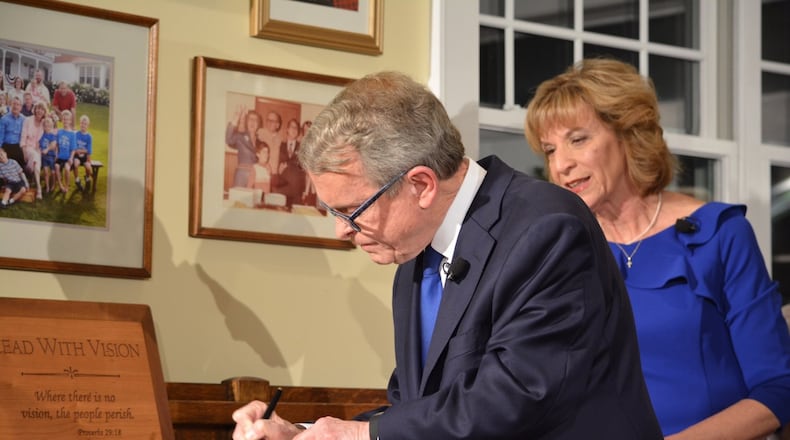Related: DeWine takes office: Promises to focus on children, fight opioid epidemic
DeWine, a Cedarville Republican, signed an order re-stating one put in place by former governor John Kasich late last year. It is an anti-discrimination policy for state government that includes protections against discrimination based on gender identity or expression. The order also prohibits discrimination based on “status as a parent during pregnancy and immediately after the birth of a child, status as a parent of a young child, status as a foster parent.”
“As a matter of basic human decency persons employed by the State of Ohio should be treated with appropriate respect and civility by their fellow State employees and are entitled to be employed in a workplace that is free of unlawful and inappropriate discrimination,” the order stated.
Related: Photos from DeWine inauguration
State Sen. Nickie Antonio, D-Lakewood, an openly gay woman, said the family-friendly employment policy is a model and “is truly the right thing to do.”
Alana Jochum, director of Equality Ohio, called it a strong statement that DeWine will be governor for everyone. “Ohio is still playing catch-up when it comes to welcoming LGBTQ people — and we are grateful that the Gov. DeWine, like Gov. Kasich before him, recognizes the need for these common-sense protections in Ohio,” she said.
Human Rights Watch Ohio State Director Shawn Copeland also called on Ohio lawmakers to pass a bill that would bar discrimination based on sexual orientation and gender identity in jobs and housing. Legislation advocating for such protections over the past 10 years has so far failed to gain approval in the General Assembly.
Related: Ohio lawmaker pushes for protections for gays in jobs, housing
The governor signed other orders that take steps toward making good on promises to focus on the opiate crisis and children’s issues.
DeWine signed an order that creates the governor’s RecoveryOhio Initiative, which aims to address the opiate addiction crisis through prevention, treatment, criminal justice and recovery programs. RecoveryOhio will coordinate efforts that are now split across multiple state departments.
In December, DeWine named Alisha Nelson as director of RecoveryOhio. Previously, Nelson served as director of substance use policy initiatives for DeWine when he was attorney general.
He also signed an order creating the Children’s Initiative to address issues such as kindergarten readiness, infant mortality and education gaps. He previously named LeeAnne Cornyn as director.
He signed another order that boosts the profile of foster care within the Ohio Department of Job and Family Services. More than 15,000 children were in foster care at any given time in 2018, a 25 percent increase over 2013 due in large part to the opioid addiction crisis. Each year, about 1,000 teens emancipate out of foster care without ever landing in a permanent home.
Related: Dayton Daily News stories of child deaths prompts calls for reforms
DeWine also signed an order establishing Ohio as a ‘disability inclusion state and model employer’ of people with disabilities. Roughly 1.6 million Ohioans have disabilities, including 870,000 who are of working age. The order mandates that state agencies review hiring practices and knock down non-job related employment barriers.
And DeWine signaled that prevention efforts will be central to how he addresses the opioid crisis. He ordered the Ohio Department of Mental Health and Addiction Services to create a senior level post to focus on prevention education for K-12 students.
About the Author

